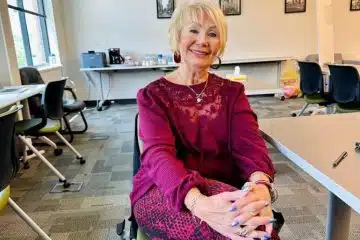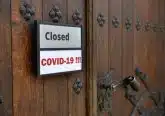‘It’s a trauma for our children’: How the pandemic is impacting foster kids
by Mary Farrow
Denver, Colo., Apr 9, 2020 / 04:30 am (CNA).- Foster care is a difficult business in the best of times.
Social workers must ensure that children in need are given loving and safe homes, while trying to help them maintain contact and a relationship with their biological family. Kids have to adjust to new families and new routines while keeping up with schoolwork. Families accepting foster children are routinely monitored and must make adjustments to accommodate the new member of their family, who will be with them for an often unknown period of time.
Now, adding a pandemic – and all of its isolating and social distancing requirements – into the mix has made matters even more difficult.
“It’s a trauma for our children who’ve had a life built and now it’s gone,” Martha Holben, who works as the child welfare assistant director for St. Vincent Catholic Charities in Lansing, Michigan, told CNA.
Holben told CNA that for foster children, whose lives are already marked with so much disruption, the routine of school, and seeing friends and teachers they can count on, as well as regularly scheduled meetings with their families, are a big deal.
“And one day that was just all gone,” Holben said. “So we’re definitely seeing an increase in some outbursts with kiddos because their schedule is gone, and the people that they’ve built into their life that they could trust – their principal, their guidance counselor – all of that is gone, and some of them are too young to really understand why.”
Michigan has been one of the harder-hit states in the coronavirus outbreak in the U.S., with 20,346 confirmed cases and 959 deaths as of April 8. Holben said that while none of her program’s children and families have yet been diagnosed with coronavirus, concerns about spreading the disease have made it very difficult to find new foster families for children in recent weeks.
“We’ve had a child that we’ve been searching for placement for a couple of weeks,” she said.
“Luckily right now he’s in a place that’s willing to keep placement until another placement is able to be located, but because of the risk of COVID-19, prospective foster parents for this child are not willing to take a new placement right now,” Holben added.
While none of the children have tested positive for coronavirus, Holben said that families worry about accepting new children because experts believe that many people are carriers of the virus without ever showing symptoms, and prospective foster families are hesitant to put the rest of their family at risk.
Jennifer Hartwig is the senior program manager of foster care services for Catholic Charities Community Services in Phoenix, Arizona. So far, the state of Arizona has not been as hard hit by coronavirus as states like Louisiana, Illinois, California or New York. As of April 8, there were 2,726 cases in Arizona and 80 deaths.
Hartwig told CNA that their foster care program has changed the way it offers services – basically everything is online for now – “but we are going above and beyond trying to meet the needs of all of our families at this time. So we haven’t slowed down,” she said.
Families in the area are also still offering to take children in, even though the threat of coronavirus remains, Hartwig added.
“The response has been wonderful. Families are still stepping up,” she said. “The director of DCS (Department of Child Safety) does weekly updates for all of the providers in the area, and we’re still seeing about 20 children a day coming into the system needing homes. So children are still being placed at this time, and the families are stepping up.”
Hartwig compared social workers working with foster children to first responders, and added that while they are doing basically everything virtually, they do have permission from the governor and the DCS to step in and do home visits if there is a suspected crisis.
“As needed, if there’s a crisis, we will go in person and if everybody’s healthy and asymptomatic, we will do home visits,” Hartwig said.
“The directive from our governor and from the director of the DCS here in Arizona has stated that all visits have to be virtual…(but) safety’s number one. That’s been the message from everyone, child safety is number one,” she said. “We are, I’d say, right under doctors and nurses, we are still first responders.”
Other support being offered to families at this time include help finding diapers or formula or anything else they might need that could be in short supply in stores at this time Hartwig added.
She said when families have had concerns about possible cases of coronavirus, they’ve asked them screening questions and directed them to medical care. But so far, as of last Friday, none of the children in foster care in the state had tested positive for the virus.
“We have about 14-15,000 children in care in the state and (it has been) reported that there’s no child that’s been tested positive,” Hartwig said.
Unlike Arizona, New York has been the worst-hit state by coronavirus in the U.S. so far, accounting for 149,316 cases, with 6,268 deaths.
Good Shepherd Services, a foster care agency affiliated with the Archdiocese of New York, told CNA it has been scrambling to keep up with new federal, state and local guidelines as the coronavirus pandemic has come full force to the city. Good Shepherd Services oversees children in homes with foster families, as well as children in residential programs.
“I mean it certainly has turned our world upside down,” Denise Hinds, the associate executive director of foster care, juvenile justice and supportive housing at Good Shepherd Services, told CNA.
“It just creates a whole new level of stress and anxiety for everyone. From our own staff, to the birth parents who want to see their kids – they’re used to seeing their kids every week- so foster parents have to bring the kids in, or they must have phones, and birth parents have to have cell phones, so it’s just become quite an issue,” Hinds said.
Like Holben, Hinds also said she was concerned about the effect that closed schools were having on children in foster care. Not only were the closures disruptive to their routines, but the children are also losing access to additional learning and behavioral supports that are available to them at school.
A higher number of children in foster care “have many learning challenges and oftentimes more than the general population…many of our kids who come into residential care are several grade levels behind their peers, because they’ve moved around so many times before they get to us. So, we’re looking at the most vulnerable of the children in New York City, in terms of education, not having all the services they would normally have on a day to day basis,” she said.
The impact of the pandemic on foster care social workers has also been “tremendous”, Hinds said, because they have had to adapt to every-changing guidelines while still trying to meet the needs of children, foster families and biological families.
Initially, she said, they were still allowing family visits on-site at their facilities, but as time has gone on, the program has had to adapt to virtual visits and meetings, unless safety issues are a concern.
“This is all very new to us and to the families,” Hinds said.
Michelle Yanche, executive director of Good Shepherd Services, told CNA that the program had a “wake-up call” early on in the stages of coronavirus restrictions and shutdowns when, on a Friday night, a foster parent called, looking for a different placement for the child under their care, because the parent was showing symptoms of what was feared to be coronavirus.
The parent’s test for the virus was ultimately negative, and the child was able to be returned to the home, but Yanche said it made her realize that they would immediately need to implement new coronavirus protocols.
“It quickly was a wake up call for us that we need some new systems to be in place…to be able to manage these kinds of potential disruptions in the middle of the night,” she said. Fortunately, she said, those kind of late-night interventions have “not been as needed as we worried that it would be.”
Still, Hinds said they have had to move children around who have been exposed to the virus, but they have been lucky in finding foster homes to send them too. While they’re not onboarding a lot of new families at this time, she said families on their list have stepped up to take in these children despite the risk of the virus.
“So, those are some of the complexities, but we have been very fortunate to be able to continue our intake and support children when needed with our existing vacant foster homes,” she said. “We’re continuing to do that as we have been all along. I don’t think that has slowed down at all.”
Like leaders at a lot of organizations, Hinds and Yanche are also worried about the long-term financial impacts that a prolonged economic downturn will have on their programs.
Another concern has been providing PPE (personal protective equipment) to staff who either need to do in-home visits to homes that have known cases of or exposure to coronavirus, as well as staff in residential programs with children who may have been exposed and are in quarantine under their care, Hinds added.
“We’re doing our best to get a hold of equipment, and we’ve had some support from Catholic Charities and other organizations, but it is a daily concern because we have 24/7 programming,” she said. “So, we’re guarding our N95’s (facemasks) like it’s gold right now…we want to make sure we can keep our staff safe.”
Holben told CNA that people who want to help foster children, but are unable to open their homes to them, can be helpful through prayer.
“All of our foster parents, regardless of what we’re going through or regardless of what they’ve gone through in any cases, they always need prayers. All of our kiddos need prayers, our biological families need prayers,” she said.
“So I just always like to put a little plug out there when people don’t know what they can do for foster kiddos or parents. Just send some positive energy our way so that we can all get through it. Because it’s stressful enough without the added COVID-19 stuff.”













